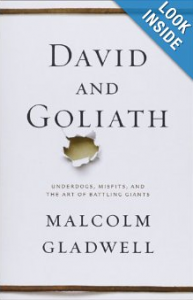I recently read “David And Goliath: Underdogs, Misfits, and The Art of Battling Giants” by Malcolm Gladwell. Below are the quotes I found most useful (the page numbers in this case are the large print edition, which I got by accident). As always, if you like the quotes, click here to buy the full book.
 “We think of things as helpful that actually aren’t and think of other things as unhelpful that in reality leave us stronger and wiser.” (37)
“We think of things as helpful that actually aren’t and think of other things as unhelpful that in reality leave us stronger and wiser.” (37)
“To play by David’s rules you have to be desperate. You have to be so bad that you have no choice. Their teams are just good enough that they know it could never work. Their players could never be convinced to play that hard. They were not desperate enough.” (53)
“We spend a lot of time thinking about the ways that prestige and resources and belonging to elite institutions make us better off. We don’t spend enough time thinking about the ways in which those kinds of material advantages limit our options.” (57-58)
“What matters, in determining the likelihood of getting a science degree, is not just how smart you are. It’s how smart you feel relative to the other people in your classroom.” (140)
“There are such things as “desirable difficulties.”” (171)
“Most people with a serious disability cannot master all those steps. But those who can are better off than they would have been otherwise, because what is learned out of necessity is inevitably more powerful than the learning that comes easily.” (189)
““My upbringing allowed me to be comfortable with failure,” Cohn said. “The one trait in a lot of dyslexic people I know is that by the time we got out of college, our ability to deal with failure was very highly developed. And so we look at most situations and see much more of the upside than the downside. Because we’re so accustomed to the downside. It doesn’t faze us.” (207)
“Dean Simonton says, “Gifted children and child prodigies seem most likely to emerge in highly supportive family conditions. In contrast, geniuses have a perverse tendency of growing up in more adverse conditions.”” (239)
“The contrast between the previous apprehension and the present relief and feeling of security promotes a self-confidence that is the very father and mother of courage.” (250)
“Courage is what you earn when you’ve been through the tough times and you discover they aren’t so tough after all.” (252)
“The right question is whether we as a society need people who have emerged from some kind of trauma – and the answer is that we plainly do. This is not a pleasant fact to contemplate.” (275)
“Disobedience can also be a response to authority. If the teacher doesn’t do her job properly, then the child will become disobedient.” (351)
“When people in authority want the rest of us to behave, it matters – first and foremost – how they behave.
This is called the “principle of legitimacy”,” and legitimacy is based on three things. First of all, the people who are asked to obey authority have to feel like they have a voice – that if they speak up, they will be heard. Second, the law has to be predictable. There has to be a reasonable expectation that the rules tomorrow are going to be roughly the same as the rules today. And third, the authority has to be fair. It can’t treat one group differently from another.” (353-354)
“The powerful are not as powerful as they seem – nor the weak as weak.” (458)
Liked the quotes? Buy the book here.

